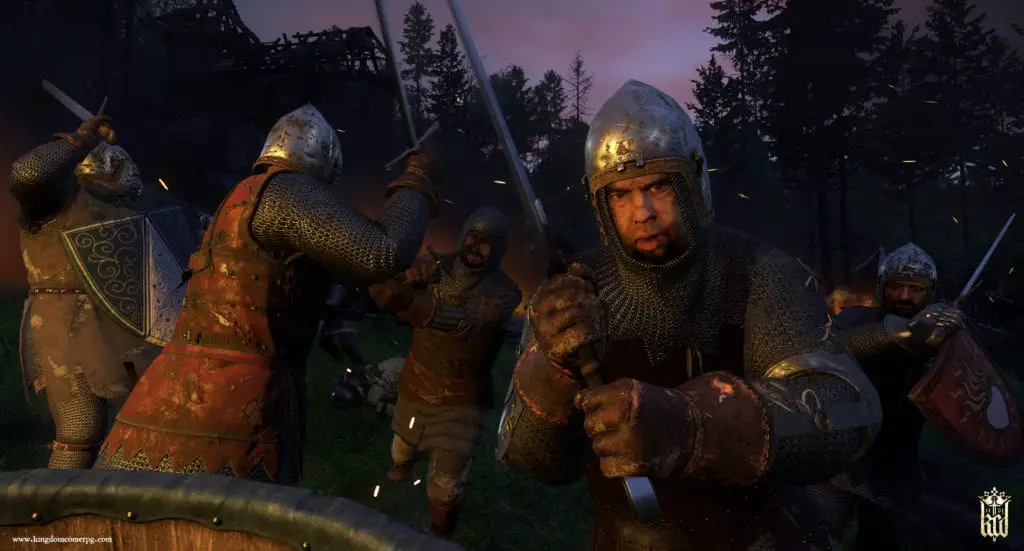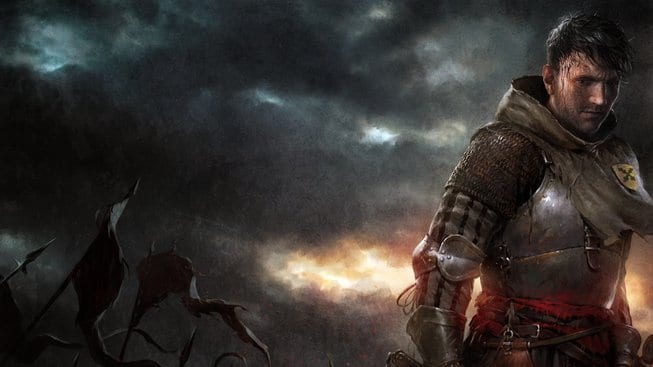Kingdom Come: Deliverance is a brand new Czech video game that just came out last week. And ever since its development started, there has been one big controversy connected to it: its almost complete lack of characters of colour.
It isn’t exactly helped by the fact that the chief mind behind the game, Dan Vávra, is right-leaning, and also a bit of an asshole when it comes to responding to these complaints. He doesn’t go far for an insult and refuses to listen to any kind of criticism. Not exactly the kind of person that makes one want to defend him.
So…this is where this article should end, right? A jerk makes a racist game, news at seven.
Well. It’s a bit more complicated than that.
Vávra isn’t the only person working in the development. And the most important thing to know about the game in this context is that it’s not a generalized medieval setting. Instead, it takes place in a particular set of villages and towns and the surrounding forests, villages, and towns that exist until today and that aren’t and never have been big or cosmopolitan in any way. A number of events in the game are based on historical events. It isn’t just a story, it the story of Česká Skalice just before the Hussite wars.
In this context, the usual arguments of “there were plenty of people of colour in Europe in the Middle Ages” fall kind of flat. The usual argument of historicity that is pulled for this is frequently false because Western history is whitewashed and contained markedly more people of colour that we like to pretend. But it’s not always false. There actually were parts of the world where only white people lived. And not only are there no particular historical marks of black, brown or Asian people being present in the particular time and place where Kingdom Come takes place, it would also be very unlikely.
Honestly, the most likely place to find a person of colour in the time period would be Sigismund’s armies, and since those play more the role of the antagonist in the game, that’s not exactly ideal. So this is not, in fact, a case of ignoring the real historical presence of black and Middle-Eastern people.
Instead, the first question to ask here is: is it ever legitimate to create all-white media? If we’re depicting a situation where there realistically wouldn’t be any people of colour – not just history, there are still plenty of towns in the world a non-white person has never set foot in – is it all right to make it whiter than new house paint?
On the face of it, the answer should be yes. As long as we’re depicting an actual situation, we’re depicting. And yet. It may be “accurate,” but it might at the same time be unwise in the current climate, where every all-white piece of media contributes to a narrative that is far from inclusive to people of colour.

So the second question: does it even matter? That is, is historical realism such an important goal to achieve?
Most media that supposedly take place in the past play hard and fast with history to make things more convenient for the narrative, so why should the amount of diversity, of all things, be what is kept realistic? It shouldn’t, that is the answer. As long as other things are changed freely, the argument of historicity is irrelevant one way or another.
Kingdom Come, however, is a game that takes great care to be as realistic as possible. The most frequent complaint from players at the moment is the insane difficulty of lockpicking because that isn’t easy in real life either. So does this change anything? Is the argument of historicity valid in such a case? In other words, even in those media that do their best to stay historically faithful, is such an ambition a worthy goal? Is it more important to have something fit history perfectly than to provide representation?
Accusations of rewriting history would naturally follow a negative answer. First, it’s important to point out that it’s no more rewriting than the constant whitewashing, and with a much better intention. But it is true that with a game that boasts of its realism, it presents a problem. It would discredit their claims of historicity if they simply ignored these kinds of facts. You cannot painstakingly reconstruct medieval Skalice and then add random representation from all over the world without becoming a laughing stock. Not the least because this sort of rewriting of history would play down the racism of the past, and that is not an excuse we should be making for ourselves.
Unless we say that media has to abandon goals of high historical realism, then, we have to admit that in certain setting an all-white cast is appropriate. So that brings forth another question: is it legitimate to choose such settings?
And this brings us to the more complicated power dynamics at play when it comes to Kingdom Come.
As I’ve said, Kingdom Come is a Czech game, dealing with events from Czech history. My history. We, as a country, have always played the lovely game of being both oppressors (towards Slovaks, the Jewish and the Romani people, and even Germans after WWII) and oppressed (by the Austrian empire, Nazi Germany, USSR). In the global world of today, we’re far from being the ones in the most desperate situation, but we’re also hardly the top dogs. On the global scale, we’re a minority.
And both our history and our present are mostly white.
Just to be perfectly clear, this is not a good thing. I’m not saying it as a good thing. It massively contributes to the widespread xenophobia in the Czech Republic. But it is what it is. The fact remains that our by far biggest minority are the Romani people, who form about 3% of the population. So every time you tell a Czech story, it is going to be overwhelmingly white.
So should we be allowed to tell our own stories?
Kingdom Come, of course, is not made for the Czech market. It’s distributed globally, and it means it has a global effect, on people who know nothing of our particular context. As an all-white medieval game – which is all most people will take out of it – it perpetuates exactly the image of whitewashed history that we need to rid ourselves of. It becomes part of the problem.
So does this mean, then, that when we want global money, we have to change the image of our own history to avoid exacerbating the global problem of racism? That is problematic as well, especially as making the game for Czech audience only is not a real option. Our ten million people total don’t make for a big enough audience to pay for a game with this kind of budget. It’s another kind of disadvantage global minorities have. It shouldn’t be necessary to pay for it by adjusting our stories.
And even disregarding that, what if we want to show our stories and our world to the rest of the planet? What if we want to share ourselves? We should be able to do that.
Yet…what if what we want to share turns into a white fantasy in others’ hands?

It seems it shouldn’t be such a big deal. Who cares if we change the skin colour of some characters in the story? It’s still going to be a Czech story. But the problem is, it doesn’t quite work that way. After all, that is the “I don’t see colour” argument, only in reverse.
What I’m about to say will sound insanely racist to anyone from a more cosmopolitan country, but when I was little, I didn’t like watching Sesame Street because the multi-ethnic children there were making it so very foreign to me. I saw them and instantly knew it wasn’t my world. Outside of my travel abroad, I spoke to one non-white person total before adulthood. And I live in the capital, the most multicultural part of the country. Whatever it says about us, the truth is that if we populate historical Czech stories with black people, most Czechs will not regard it as their story.
But there is a reason I was specific in this last sentence. There are truly very few black people living in this country even now. You know who is living here, though? The aforementioned Romani. The presence of Romani people in the game would not make any Czech person feel like it was not our story. It would make them angry — because the racism the Romani face in the Czech Republic is something incredibly ugly — but it would not make the game feel foreign. The Romani minority has been here since the Middle Ages, and there are definitely historical records of them being here in large numbers shortly after Kingdom Come takes place. In fact, there are even complaints of there being “more and more” Romani people in our records because of course our racism would be traditional.
We don’t know, of course, if there were any Romani around Skalice, but it was a way to include people of colour that wouldn’t break with general Czech history. It wouldn’t have gone against our own understanding of who has lived here for a long time. And yet they were never mentioned in any of the diversity complaints I have seen. There are also Cumans included in the game, and no one seems to care much either. And that brings me to my last point.
Demanding diversity in Kingdom Come with a particular idea of diversity in mind, the idea that is based on the ethnic composition of the US, is not only American-centric but also offensive to the oppressed minorities of the Czech Republic. And complaining about such lack of diversity truly does not come across in a way that would endear the author of the complaint to anyone Czech. Especially if the person complaining is white. If a person of colour is offended by so much mayo in their game and would like to feel represented, I can understand that.
But when a white privileged American talks about what sorts of representation a Czech game should contain – particularly with arguments like that Czechia is “just north of Italy” and Italy is by the sea so obviously there’d be plenty of people of colour in here, which is an actual argument someone presented – it suddenly gains whole another tone. Because whiteness is not the only privilege in the world, and while we certainly benefit from it, we do not benefit from the privilege of being American, and anyone from the US telling us how to tell our own stories without knowing anything about us is always, always going to ring a very uncomfortable bell with us.
So yes, making all-white games should be avoided when possible, because it reinforces an uncomfortable narrative. And representation is a good thing, especially representation of those who hardly ever find themselves on screen. Whenever at least a little possible, diversity should be supported. Warhorse Studios really should have included Romani people in their game, just as Czech filmmakers should try casting some in their films. But not all representation fits one muster and demanding medieval Skalice should look like medieval London only makes stories more identical to each other and less interesting. There is more than one kind of diversity.

